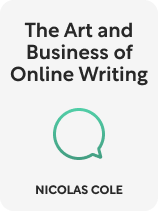

This article is an excerpt from the Shortform book guide to "The Art and Business of Online Writing" by Nicolas Cole. Shortform has the world's best summaries and analyses of books you should be reading.
Like this article? Sign up for a free trial here.
Have you ever wondered how to turn your online writing into a profitable venture? Are you curious about the different ways to monetize content?
The Art and Business of Online Writing by Nicolas Cole identifies three main methods for making money from your online writing. You’ll learn about paid access, employment opportunities, and advertising strategies that can help you turn your passion for writing into a sustainable income stream.
Keep reading to discover which content monetization method might work best for you and your audience.
Monetize Content Online
Once you have a solid audience visiting and utilizing content from your personal platform, you can start integrating money-making methods. Cole says there are three main methods you can use to monetize content.
Method #1: Paid Access
The first method Cole suggests to make money off your content is to create even more detailed content from your pillar pieces, master guides, and free courses that you can sell to people. Everything up to this point should be free to entice people and gain their trust and consistent attention. Once you have this audience, you can create something that offers them even more than everything you’ve already combined. For example, you could offer a subscription-based newsletter, a paid interactive course, or a book (such as The Art and Business of Online Writing).
(Shortform note: Once you’ve created paid content, how much should you charge and how many subscribers can you expect? Studies show that the average price for a paid newsletter is $11 per month and doesn’t usually go below $5. Further, you can expect roughly 5% of your subscribers to convert from your free content to your paid content. This means that if you have 1,000 people on your email list, only 50 of them will likely subscribe for paid content.)
Method #2: Employment
The second method Cole suggests to make money off your content is to use your proven skills to write for other people. Having a personal platform with your own content library and a stable and consistently engaged audience proves to people that you’re a successful writer. You can now offer to share your talents with others for a fee. For example, you can be a content writer for a company or a ghostwriter for individuals who have credibility through expertise but not the writing skills to share that expertise.
(Shortform note: If you want to work as a freelance writer using your content as a portfolio, you can advertise yourself and find jobs on popular websites such as SmartBlogger, UpWork, Craigslist, and Flexjobs. To succeed on these sites, make sure you 1) regularly produce high-quality work for clients (this can win you awards and badges on the site that clients see), 2) write unique proposals explaining why you’re the best person to solve the client’s problem, 3) ask clients for feedback after projects, and 4) maintain relationships with clients so you can work with them again in the future.)
Method #3: Advertising
The final method Cole suggests to make money off your content is incorporating advertising into your personal website. This method works in a few ways. First, you can have companies pay you to allow their ads to appear on your content. Second, you can have brands pay you to directly endorse their products (for example, recommending users try a particular online therapy company in your relationship articles for people with depression). Third, you can become an affiliate—this is like the second option, but you make money through commissions every time someone uses your link to visit their platform or purchase their product.
(Shortform note: Be careful when advertising. The Federal Trade Commission (FTC) has strict guidelines you must follow whenever you provide an endorsement or testimonial for a product that’s not your own and for which consumers are likely to believe reflects your beliefs or experiences. According to these guidelines, you must “clearly and conspicuously” disclose your affiliation or you could get into legal trouble.)

———End of Preview———
Like what you just read? Read the rest of the world's best book summary and analysis of Nicolas Cole's "The Art and Business of Online Writing" at Shortform.
Here's what you'll find in our full The Art and Business of Online Writing summary:
- The two things you must do to create a successful online writing career
- How often you should publish online
- Where to post your content for maximum impact






